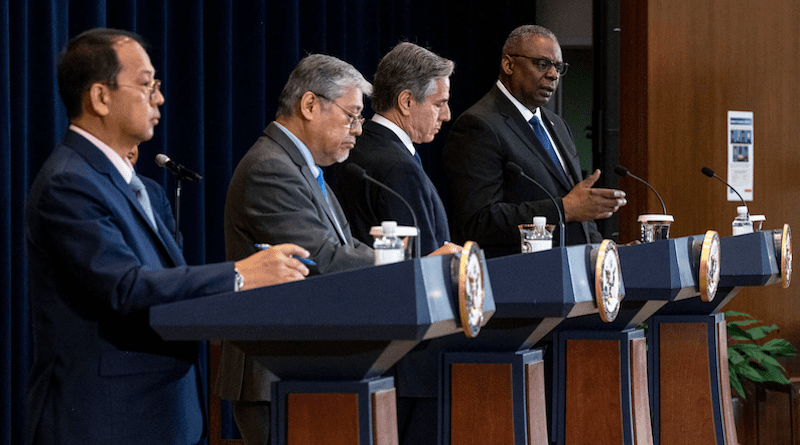EDCA Expansion Damages Philippines-China Relations – Analysis
When President Ferdinand “Bong Bong” Marcos Jr officially announced the four additional locations for the expansion of Enhanced Defense Cooperation Agreement (EDCA) with the United States, the Chinese Embassy in Manila vehemently reacted by stressing that the EDCA expansion could “seriously” endanger Philippine security interests and even regional stability.
In its official statement, the Chinese Embassy stressed that EDCA expansion aimed to support US efforts “to encircle and contain China through its military alliance” with the Philippines. The Embassy also explained that the Philippines security arrangement with the US had the intention to secure American hegemony and “selfish geopolitical interests” arising from its “cold war mentality”.
Speaking at the Manila Forum on April 14, Chinese Ambassador to the Philippines Huang Xilian even exclaimed that “the US intends to take advantage of the new EDCA sites to interfere in the situation across the Taiwan Strait to serve its geopolitical goals and advance its anti-China agenda”. The ambassador even warned that the safety of 150,000 Filipino workers in Taiwan would be compromised because of new EDCA sites.
The Foreign Ministry of China also conveyed a strong statement describing the EDCA expansion as really “uncalled for”. It urged the Philippines and its Asian neighbors to “think carefully” about American military deployment in the region if it could “truly help protect sovereignty and security” of one’s country. The Foreign Ministry warned the US military presence could even cause grave “irreparable consequences” for regional security and national security of Asian states.
Apparently, the EDCA expansion has tremendous implications for the future direction of Philippines-China relations. If not properly managed through friendly consultations and direct negotiations, EDCA expansion can seriously damage the current state of Philippines-China relations.
China regards the EDCA expansion as directed against Beijing despite the repeated denial of the Pentagon and the Armed Forces of the Philippines. The four additional EDCA sites are in areas deeply touching the security sensitivities of China in the Taiwan Straits and the South China Sea.
China regards three new EDCA sites in Naval Base Camilo Osias in Sta. Ana, Cagayan; Lal-lo Airport in Lal-lo, Cagayan; and, Camp Melchor Dela Cruz in Gamu, Isabela as carefully selected to support American Air-Sea Battle strategy in the Taiwan Straits.
On the other hand, China considers the new EDCA site in Balabac Island of Palawan as essential to facilitate stealth US submarine activities in the South China Sea.
Thus, China opposes the EDCA expansion for militarizing existing conflicts in the Taiwan Straits and the South China Sea.
Though the Philippine government explained that the EDCA expansion was not directed against China, Beijing, however, was not buying it. By allowing Philippine territories as access to American military activities in the Taiwan Straits and the South China Sea, the Philippines can become the target of China’s military actions to defend its interests in the Taiwan Straits and the South China Sea.
For China, the Taiwan issue is an internal problem that it can settle politically through its formula of peaceful reunification. The South China Sea issue, on the other hand, is a regional issue that it can settle with parties directly involved through peaceful consultations and functional cooperation.
China regards US military actions in the Taiwan Straits and the South China Sea as serious disruptions to all efforts towards peaceful managements of these conflicts.
Regrettably, China perceives that the Philippines is contributing to the disruptions through the EDCA expansion.
Unless the Philippine government finds effective ways to calm China’s current reactions on the EDCA expansion, it will be utterly difficult for President Marcos Jr to shift Philippines-China relations to a higher gear.
China’s strong reactions on EDCA expansion, if blown out of proportion, can even lead to the unintended deterioration of Philippines-China relations that can harshly affect the Philippine government’s goal of achieving post-pandemic economic recovery with China.
To sustain friendship and enhance cooperation with China in the post-pandemic era, it is therefore imperative for the Philippine government to quickly repair its damaged ties with China inevitably caused by the EDCA expansion.
Dr. Rommel C. Banlaoi currently the President of Philippines-China Friendship Society and Chairman of the Board of Advisers of the China Studies Center at the New Era University. He is a member of the Management Board of World Association for Chinese Studies and a former President of the Philippine Association for Chinese Studies.

